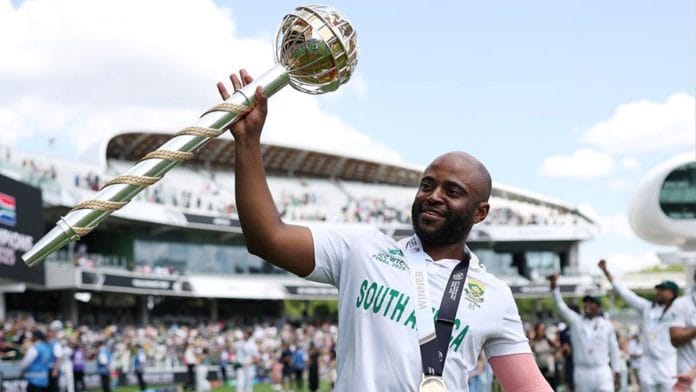Captain of the South African cricket team, Temba Bavuma, said, “I have been called a lot of names in my life, some names hurt – choker, quota, bauna (dwarf). But the name I’ve been called the most is Temba. My grandma named me Temba because it means “hope”, hope, for our community.”
South Africa has a complex racial history in sports. For decades under apartheid, the country’s sport was segregated by law and policy. Black players were excluded from international games.
The sporting boycott that isolated South Africa from the 1970s was one of the most powerful global responses to apartheid. It sent a strong message that racial injustice would not be tolerated. Players and teams who ignored this ban did so at a heavy cost. So much so that the backlash in the West Indies to a rebel tour of South Africa in the 1980s destroyed the lives of an entire generation of talented cricketers. Several of them ended up on the streets, where men like former Windies wicketkeeper David Murray became victims of drug addiction and died in penury. Only after apartheid’s collapse in the early 1990s did South Africa reenter the international sporting arena, marking a milestone in racial reconciliation.
Tainted anti-apartheid legacy
India was at the forefront of the international condemnation of apartheid. Our stance was not mere rhetoric but a principled, often costly commitment to racial justice. In 1974, India famously forfeited the Davis Cup tennis final against South Africa. A final that India was expected to win with ease, its best chance at tennis glory. The boycott reverberated beyond tennis and symbolised India’s broader diplomatic and moral opposition to racial segregation. India’s refusal to legitimise apartheid through sport was a profound act of solidarity with oppressed South Africans.
Quite appropriately, India was also the one responsible for welcoming South Africa back into international sport. In 1991, it was on India’s invitation that the Proteas re-emerged on the global cricket stage in Kolkata. It is, therefore, unfortunate that Temba Bavuma was subjected to racist remarks by fans at the very venue where the shackles of apartheid on the sport were once symbolically and decisively broken. It happened on Day 1 (14 November) of the first test between India and South Africa.
This behaviour of a few fans at Eden Gardens and that of hordes of keyboard warriors that followed reverberates far beyond cricket. It touches deep historical wounds and places India’s proud anti-apartheid legacy under an unflattering spotlight.
Perhaps the most unfortunate part is that it was inadvertently triggered by unthinking, immature, and ill-advised sledging from two of India’s most iconic cricketers—Jasprit Bumrah and Rishabh Pant, caught on the stump mic calling Bavuma as ‘bauna’ or a dwarf.
The derogatory remark set off even more offensive comments on social media, with overtly racial language aimed at the South African captain. This behaviour reflects an ignorance of our own history as a nation, suggesting a selective memory of India’s own painful experiences with discrimination and injustice. Equally, it jeopardises India’s moral stature as a champion of equality and human rights.
Also read: Mihir Sen was the first Indian to swim the English Channel. It began with a letter to Nehru
Bavuma’s figurative slap
What we in India perhaps don’t appreciate is that even today, race remains a sensitive and divisive factor in South African sport, requiring deliberate policies and ongoing efforts to ensure equality and representation. Bavuma himself, South Africa’s first Black Test captain, embodies the progress made but also the challenges that persist in transforming societal attitudes.
The response from the soft-spoken Bavuma this week was calm, measured, and poignant. In public statements and social media, he expressed sadness and resilience, saying he did not expect such hostility from Indian fans, a country familiar with complex struggles around race and equality. He highlighted the irony of facing racism in India, a brown-skinned nation that had stood firmly against apartheid and racial injustice globally. If there was ever a figurative slap in the face, this was it. MK Gandhi, who made his name fighting racism in Bavuma’s country, would have thoroughly approved.
Bavuma, as the leader of his nation on the cricket ground, has taken ownership of the battle not just on the pitch but in the hearts and minds across the world, calling for an end to racism in sport and society alike. India’s cricket fans, team, and administrators have both the opportunity and an obligation to honour the shared history of struggle against racism and celebrate the progress embodied by players like Bavuma.
Will we stand up and be counted, or spew invective from behind blue screens? The choice is ours to make. Whatever we decide will be the legacy we leave for future generations. The world is watching.
Anindya Dutta is a sports columnist and author of ‘Wizards: The Story of Indian Spin Bowling’ and ‘Advantage India: The Story of Indian Tennis’. He tweets @Cric_Writer. Views are personal.
(Edited by Ratan Priya)







Anindya Dutta and Ratan Priya, Why this emotional cry over a minor issue of “sledging” inside a cricket field. Blame it on the English first and then the Aussies who made “sledging” normal in cricket matches. It is also to be noted that sledging occurs in many professional sports. In any case, each and every sportsperson faces some kind of sledging at each stage of the career. So why this emotional cry over a minor thing! Media can make a non-issue a big issue.